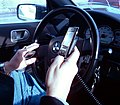Portal:Telephones

A telephone, colloquially referred to as a phone, is a telecommunications device that enables two or more users to conduct a conversation when they are too far apart to be easily heard directly. A telephone converts sound, typically and most efficiently the human voice, into electronic signals that are transmitted via cables and other communication channels to another telephone which reproduces the sound to the receiving user. The term is derived from Ancient Greek: τῆλε, romanized: tēle, lit. 'far' and φωνή (phōnē, voice), together meaning distant voice.
In 1876, Alexander Graham Bell was the first to be granted a United States patent for a device that produced clearly intelligible replication of the human voice at a second device. This instrument was further developed by many others, and became rapidly indispensable in business, government, and in households. (Full article...)

A mobile phone, or cell phone, is a portable telephone that allows users to make and receive calls over a radio frequency link while moving within a designated telephone service area, unlike fixed-location phones (landline phones). This radio frequency link connects to the switching systems of a mobile phone operator, providing access to the public switched telephone network (PSTN). Modern mobile telephony relies on a cellular network architecture, which is why mobile phones are often referred to as 'cell phones' in North America. (Full article...)
A smartphone, often simply called a phone, is a mobile device that combines the functionality of a traditional mobile phone with advanced computing capabilities. It typically has a touchscreen interface, allowing users to access a wide range of applications and services, such as web browsing, email, and social media, as well as multimedia playback and streaming. Smartphones have built-in cameras, GPS navigation, and support for various communication methods, including voice calls, text messaging, and internet-based messaging apps. (Full article...)
Selected article -

A telephone exchange name or central office name was a distinguishing and memorable name assigned to a central office. It identified the switching system to which a telephone was connected, and facilitated the connection of telephone calls between switching systems in different localities.
While small towns and rural areas might each be served by a single exchange, large cities were served by multiple switching systems, either distributed in the community constituting multiple exchange areas, or sometimes hosted in the same building to serve a densely populated area. Central offices were usually identified by names that were locally significant. The leading letters of a central office name were used as the leading components of the telephone number representation, so that each telephone number in the area was unique. These letters were mapped to the digits of the dial, which was indicated visibly on the dial's numbering plate.
Several systematic telephone numbering plans existed in various communities, typically evolving over time as the subscriber base outgrew older numbering schemes. A widely used numbering plan was a system of using one or two letters from the central office name with four or five digits. Such systems were designated as 2L-4N or 2L-5N, or simply 2–4 and 2–5, respectively, but some large cities initially selected plans with three letters (3L-4N). In 1917, W. G. Blauvelt of AT&T proposed a mapping system that displayed three letters each with the digits 2 through 9 on the dial. (Full article...)
Types of phones -

A phablet (/ˈfæblət/, /-lɪt/) is a mobile device combining or straddling the size formats of smartphones and tablets. The word is a blend word of phone and tablet. The term was largely unused by the late 2010s, since average phone sizes eventually morphed into small tablet sizes, up to 6.9 inches (180 mm), with wider aspect ratios. (Full article...)
Selected audio -
Ringing tone (audible ringing, also ringback tone) is a signaling tone in telecommunication that is heard by the originator of a telephone call while the destination terminal is alerting the receiving party. The tone is typically a repeated cadence similar to a traditional power ringing signal (ringtone), but is usually not played synchronously. Various telecommunication groups, such as the Bell System and the General Post Office (GPO) developed standards, in part taken over by the European Telecommunications Standards Institute (ETSI) and other standards bodies. With modern cell phone and smartphone technology ringing tone can be customized and even used for advertising. (Full article...)
List articles

- Comparison of smartphones
- List of best-selling mobile phones
- List of countries by number of broadband Internet subscriptions
- List of countries by number of telephone lines in use
- List of countries by smartphone penetration
- List of country calling codes
- List of iPhone models
- List of mobile network operators
- List of mobile phone brands by country
- List of mobile phone generations
- List of telecommunications companies
Related portals
General images -
Selected biography
Douglas H. Ring (March 28, 1907 in Montana – September 8, 2000 in Red Bank, New Jersey) was one of the Bell Labs engineers that invented the cell phone. The history of cellular phone technology began on December 11, 1947 with an internal memo written by Douglas H. Ring in which he proposed development of a cellular telephone system by AT&T.
Although Martin Cooper of Motorola is considered the inventor of the first handheld cellular telephone and the first person to demonstrate to reporters a handheld cell phone call, Cooper's April 1973 call used cellular telephone technology invented and developed by Bell Labs engineers. (Full article...)
Selected images
Topics
Subcategories

More
 |
Here are some tasks awaiting attention:
|
Telephones in the news
No recent news
Associated Wikimedia
The following Wikimedia Foundation sister projects provide more on this subject:
-
Commons
Free media repository -
Wikibooks
Free textbooks and manuals -
Wikidata
Free knowledge base -
Wikinews
Free-content news -
Wikiquote
Collection of quotations -
Wikisource
Free-content library -
Wikiversity
Free learning tools -
Wiktionary
Dictionary and thesaurus














































































































